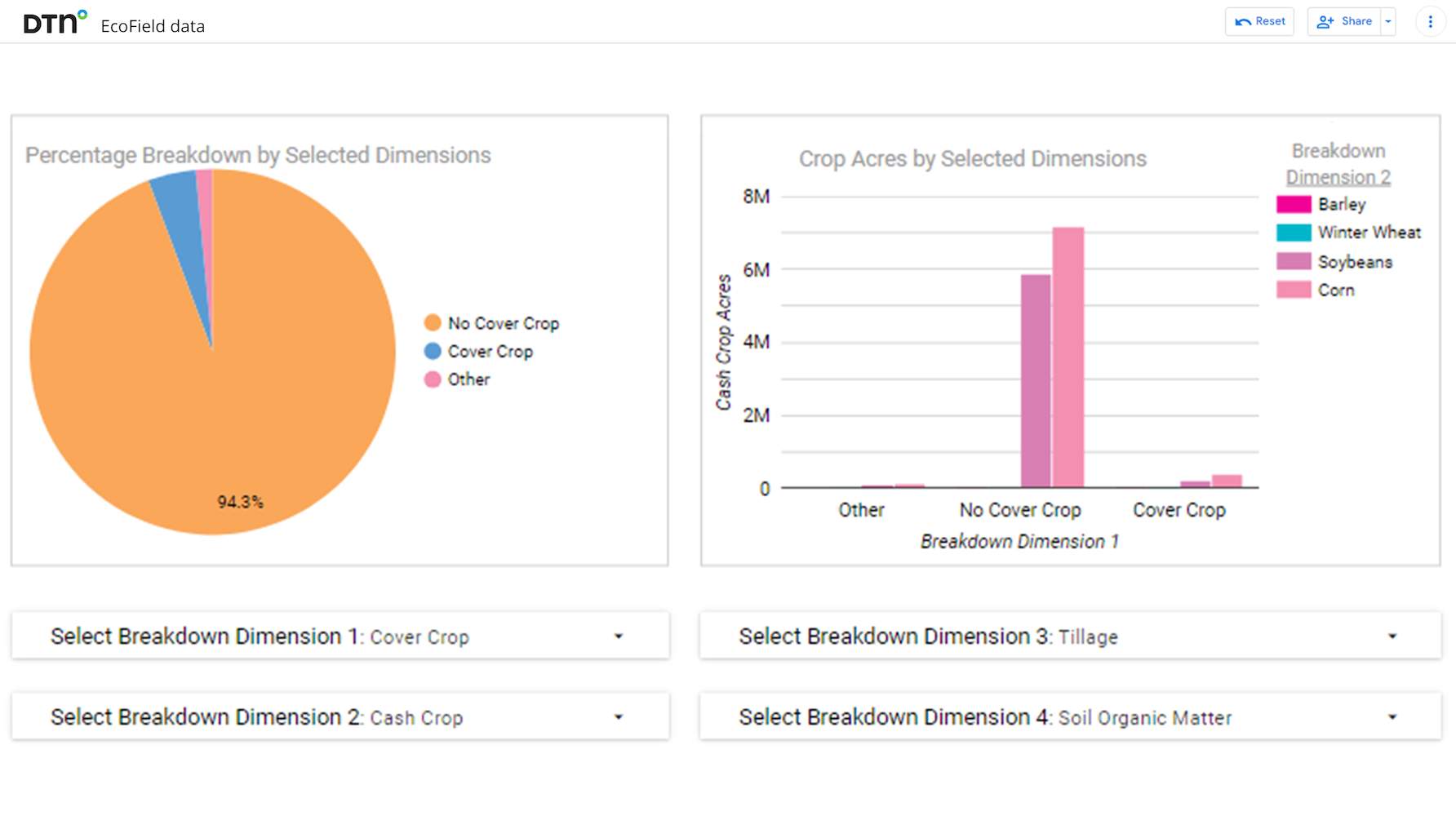
Traceability is increasingly important across agricultural sectors — and not just because of government regulations. Many consumers want to know that their food and other products have been ethically and sustainably sourced. Not all crops have kept up with the trend toward sustainable farming and labeling, however. In the U.S. grain sector, for example, few growers practice sustainable agricultural techniques, and transparency to the field level remains a challenge.
DTN, which specializes in technology, data and analytics, is among the businesses looking to change that. The company is collecting data on 19 major grain, oil seed and legume crops across 35 states in preparation for launching a sustainable marketplace in partnership with the U.S. Department of Agriculture. Using the marketplace powered by machine learning, grain buyers will be able to make their purchases based on agronomic practices like cover cropping, tillage and irrigation.
“Consumer demand is a huge one in this in the near term. Brands want to say things along the lines of 'this [is the footprint]' and be able to substantiate a claim such as 'this is a net zero product,'” Grey Montgomery, senior vice president and head of ag products and operations at DTN, told TriplePundit. He referred to the increasing number of consumer packaged goods companies that provide information about the practices behind their products through scannable codes. “That kind of degree of traceability seems to be an inevitability in consumer demand, and so we're trying to do our part to meet that.”
The marketplace DTN is developing will also be useful in regards to the U.S. Securities and Exchange Commission’s Scope 3 emissions reporting requirements. Although the SEC’s climate rules have yet to be finalized, businesses need to be prepared for when they are — which makes elective environmental, social and governance (ESG) reporting a wise move.
“A number of companies like to be able to note what their Scope 3 footprint is … and how close they are to net zero in their in their public reports,” Montgomery said. While DTN is not creating a carbon credit marketplace, the compiled data on carbon sequestration can be used as an awareness tool for potential carbon credits, he said.
DTN collects data on approximately 50 measures of sustainability, with cover crops being of the highest priority for the USDA. The practice refers to planting secondary crops after harvest in order to maintain topsoil health and prevent erosion, among other benefits. “We’re literally helping the USDA identify cover crops and make [farmers] aware of USDA funding that helps pay for the cost of conversion," Montgomery explained.

On that aspect, there’s definitely a lot of room for improvement. DTN’s data shows that the vast majority of grain farmers are not using cover crops, with many reluctant due to higher costs and potentially smaller yields, as demonstrated by NASA research.
Researchers Claire E. LaCanne, of the Natural Resource Management Department at South Dakota State University, and Jonathan G. Lundgren, of the Ecdysis Foundation, also found lower yields in a 2018 study of the effects of regenerative farming on corn crops —29 percent lower to be precise. However, profit actually increased under the sustainable model by a whopping 78 percent. “Profit was positively correlated with the particulate organic matter of the soil, not yield,” they wrote.
While the partnership between DTN and the USDA isn’t going so far as to require all-organic production, Montgomery is confident the sustainably grown grains, seed oils and legumes will fetch a higher price. And that will entice more farmers to convert to sustainable practices.
“The gist of it is that what we're trying to create is a marketplace whereby any number of entities that seek to buy grain would be able to buy grain based on the ... sustainability traits [and] practices of farmers,” he said. “Because of those differences in traits, the goal ultimately [is that] farmers get rewarded with a premium non-commodity price for their practices.”
Image credit: Raphael Rychetsky/Unsplash

Riya Anne Polcastro is an author, photographer and adventurer based out of Baja California Sur, México. She enjoys writing just about anything, from gritty fiction to business and environmental issues. She is especially interested in how sustainability can be harnessed to encourage economic and environmental equity between the Global South and North. One day she hopes to travel the world with nothing but a backpack and her trusty laptop.














